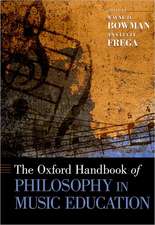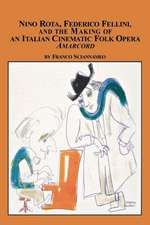Electronic Inspirations: Technologies of the Cold War Musical Avant-Garde: The New Cultural History of Music Series
Autor Jennifer Iversonen Limba Engleză Paperback – 10 ian 2019
| Toate formatele și edițiile | Preț | Express |
|---|---|---|
| Paperback (1) | 279.50 lei 3-5 săpt. | |
| Oxford University Press – 10 ian 2019 | 279.50 lei 3-5 săpt. | |
| Hardback (1) | 589.30 lei 31-38 zile | |
| Oxford University Press – 17 ian 2019 | 589.30 lei 31-38 zile |
Preț: 279.50 lei
Nou
Puncte Express: 419
Preț estimativ în valută:
53.49€ • 55.77$ • 44.45£
53.49€ • 55.77$ • 44.45£
Carte disponibilă
Livrare economică 28 februarie-14 martie
Preluare comenzi: 021 569.72.76
Specificații
ISBN-13: 9780190868208
ISBN-10: 0190868201
Pagini: 320
Ilustrații: 24 line, 36 halftone
Dimensiuni: 155 x 234 x 23 mm
Greutate: 0.48 kg
Editura: Oxford University Press
Colecția OUP USA
Seria The New Cultural History of Music Series
Locul publicării:New York, United States
ISBN-10: 0190868201
Pagini: 320
Ilustrații: 24 line, 36 halftone
Dimensiuni: 155 x 234 x 23 mm
Greutate: 0.48 kg
Editura: Oxford University Press
Colecția OUP USA
Seria The New Cultural History of Music Series
Locul publicării:New York, United States
Recenzii
Electronic Inspirations offers a number of interesting and worthwhile insights into the avant-garde electronic music of the 1950s, both in terms of historical detail and theoretical interpretation, synthesizing a great deal of published and unpublished material.
This book is addressed to an audience not only of experts but also of students and music lovers. Iverson's effort to introduce the actors, networks, and music to all kinds of readers in an astute way is very compelling. Anyone interested in electronic music and its networks will find much to enjoy in Iverson's work.
A brilliant book, pulsating with excitement: Iverson makes instant connections faster than an electric circuit, transmits information more accurately than magnetic tape, and creates a network of actors more complex than the Cologne Radio Station.
This fascinating account of the Cologne West German Radio Station and its famous underground electronic music studio traces how international networks, surplus cold war technology, and cybernetic visions and imaginaries shaped and inspired the new genre. Born from repression, the dance of agency between humans and technology, Iverson argues, is the key to understanding how this music developed. Ironically it would eventually transmogrify into today's joyous Electronic Dance Music - capital city: Berlin!
Taking the studio as an object of scholarly inquiry...helps to make legible a dynamic that is often only dimly discernible.
The greatest achievement in Iverson's book is that she documents and brings into focus the collaborative spirit of larger networks of actors and institutions, with regards both to the activities in WDR and the discourse between composers internationally...This makes her book a very worthwhile read for all interested in the early foundations of electronic music and for all engaged in the contemporary development of a plurality of new electronic music dialects.
This book is addressed to an audience not only of experts but also of students and music lovers. Iverson's effort to introduce the actors, networks, and music to all kinds of readers in an astute way is very compelling. Anyone interested in electronic music and its networks will find much to enjoy in Iverson's work.
A brilliant book, pulsating with excitement: Iverson makes instant connections faster than an electric circuit, transmits information more accurately than magnetic tape, and creates a network of actors more complex than the Cologne Radio Station.
This fascinating account of the Cologne West German Radio Station and its famous underground electronic music studio traces how international networks, surplus cold war technology, and cybernetic visions and imaginaries shaped and inspired the new genre. Born from repression, the dance of agency between humans and technology, Iverson argues, is the key to understanding how this music developed. Ironically it would eventually transmogrify into today's joyous Electronic Dance Music - capital city: Berlin!
Taking the studio as an object of scholarly inquiry...helps to make legible a dynamic that is often only dimly discernible.
The greatest achievement in Iverson's book is that she documents and brings into focus the collaborative spirit of larger networks of actors and institutions, with regards both to the activities in WDR and the discourse between composers internationally...This makes her book a very worthwhile read for all interested in the early foundations of electronic music and for all engaged in the contemporary development of a plurality of new electronic music dialects.
Notă biografică
Jennifer Iverson is a scholar of twentieth-century music, with a special emphasis on electronic music, avant-gardism, and disability studies. Jennifer's work crosses freely between music theory, musicology, sound studies, and cultural history, drawing together analysis, archival research, and intellectual discourse. Her articles appear in journals such as Music Theory Spectrum, Journal of the American Musicological Society, twentieth-century music, and Music Theory Online. In 2015-16 she was a faculty fellow at the Stanford Humanities Center and now teaches at the University of Chicago.

























